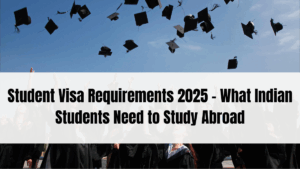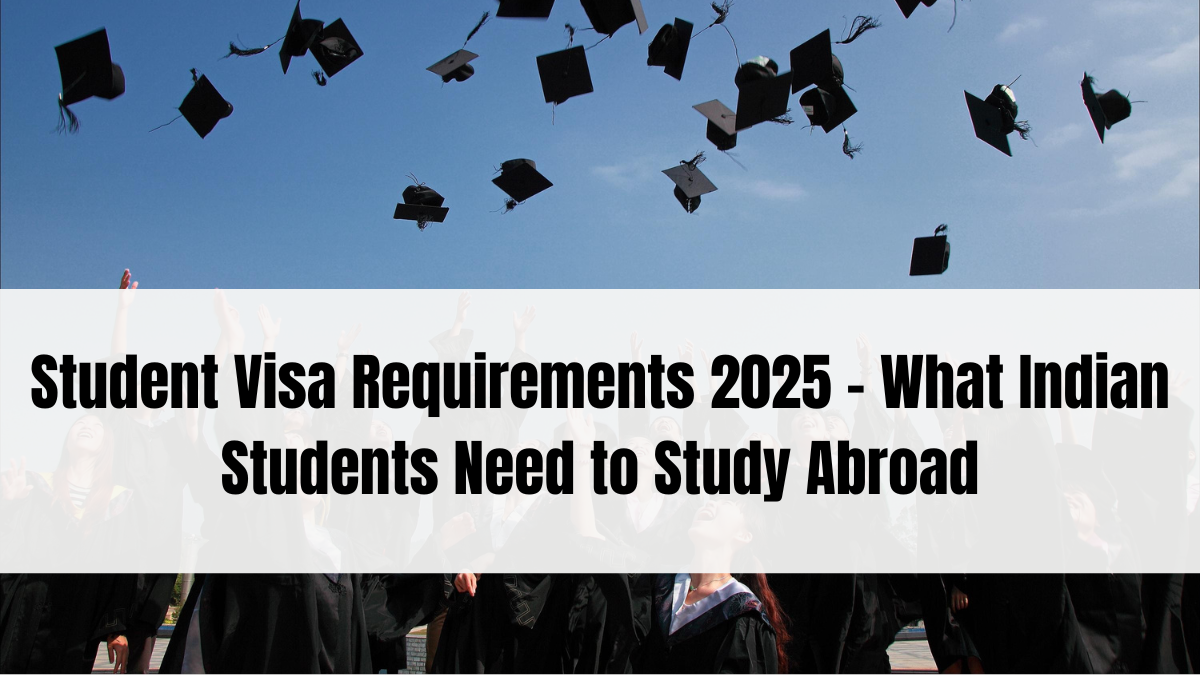Planning to study abroad in 2025? While choosing the right course and university is important, securing a student visa is equally crucial. Each country has its own Visa Requirements for Students, including proof of funds, language proficiency, medical clearance, and documentation. Understanding the complete process in advance can prevent delays and improve your chances of visa approval.
This guide explains everything Indian students need to know about the student visa process for top study destinations in 2025.

Key Documents Required for a Student Visa
While the exact requirements vary by country, most embassies ask for the following documents:
-
Valid passport (minimum 6 months validity)
-
University acceptance letter (I-20/CAS/COE/etc.)
-
Proof of financial support
-
English language test scores (IELTS/TOEFL)
-
Academic transcripts and certificates
-
Medical or health clearance (as required)
-
Visa application form and fee receipt
-
Passport-sized photographs
Country-wise Student Visa Requirements (2025)
Country |
Visa Type |
Funds Required (approx.) |
Language Test |
Work Allowed |
|---|---|---|---|---|
USA |
F-1 |
₹25–40L+ (tuition + 1 year) |
IELTS/TOEFL |
20 hrs/week |
UK |
Tier 4 Student |
₹9L+ (outside London) |
IELTS/PTE |
20 hrs/week |
Canada |
SDS / Non-SDS |
₹10L GIC + 1 year tuition |
IELTS (mandatory under SDS) |
20 hrs/week |
Australia |
Subclass 500 |
₹15–20L (tuition + living) |
IELTS/PTE/TOEFL |
40 hrs/fortnight |
Germany |
Student Visa |
€11,208 (₹10L) in Blocked Account |
TestAS/IELTS |
20 hrs/week |
New Zealand |
Fee Paying Student Visa |
NZ$15,000–20,000 |
IELTS/PTE |
20 hrs/week |
Ireland |
Stamp 2 |
€7,000+ living + tuition |
IELTS/PTE |
20 hrs/week |
Always check the official embassy or visa portal for updates as requirements can change based on political and health policies.
Financial Proof: What Counts?
Embassies want to ensure that you can afford your studies without relying on local public funds. Acceptable financial proof includes:
-
Bank statements (past 6 months)
-
Fixed deposits
-
Loan approval letters from recognized banks
-
Scholarship award letters
-
Affidavit of support (for family sponsors)
Use documents that show clear transaction history and stable funds.
Medical and Insurance Requirements
Some countries, such as Australia and Canada, may ask for:
-
Medical tests through empanelled doctors (like Panel Physicians for the US or Canada)
-
Proof of health insurance (mandatory for Germany, Australia, etc.)
-
Vaccination documents (e.g., COVID-19, yellow fever)
Check your target country’s health and quarantine policies before travel.
Application Timelines & Interview Tips
Task |
Recommended Timeframe |
|---|---|
University Application |
9–12 months before intake |
IELTS Exam |
6–9 months before intake |
Visa Application |
3–4 months before intake |
Medical and Police Clearance |
2 months before travel |
Booking Flights & Accommodation |
1 month before travel |
Tips for Visa Interview:
-
Be honest and confident
-
Know your university, course, and why you chose it
-
Explain your future plans clearly
-
Carry all documents in organized folders
Common Reasons for Visa Rejection
-
Insufficient financial proof
-
Incomplete documentation
-
Low language test scores
-
Unclear study plan or inconsistent responses
-
Poor academic background (relative to course)
To avoid rejection, always double-check country-specific requirements and rehearse for your interview.
FAQs
Do I need to pay tuition before visa approval?
In most countries like Canada (SDS), Australia, and Germany, students must pay the first-year tuition or show proof of deposit before visa processing.
Is IELTS mandatory for all countries?
No. Countries like Germany and France may waive it under specific conditions, but Canada’s SDS route strictly requires it.
Can I apply for PR after studying abroad?
Yes. Countries like Canada, Australia, and Germany offer post-study work permits that can lead to permanent residency.
How long does it take to get a student visa?
It varies—Canada and Australia take 4–8 weeks, while the UK and the USA may take longer due to interview slots.
Can I work part-time on a student visa?
Yes. Most countries allow 20 hours/week during term time and full-time during vacations.
Click here to know more.
